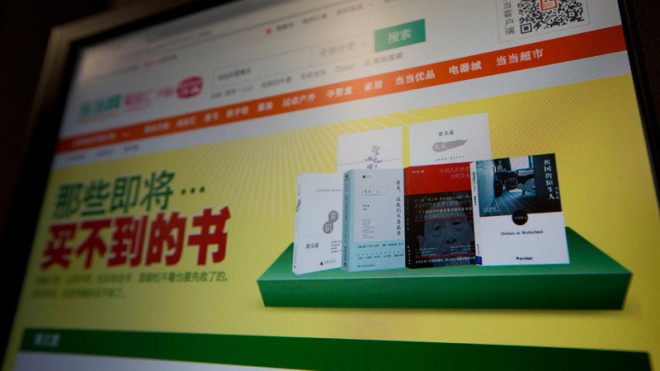China bans books by pro-Hong Kong protest author

In this photo taken Monday, Oct. 13, 2014, an online shopping website with the headline “Those books that soon can’t be bought” and images of books by authors such as Yu Ying-shih is displayed on a computer screen in Beijing. Authorities in China have ordered books by Chinese-American scholar Yu Ying-shih and several others to be removed from sale, as Beijing expresses its displeasure with writers showing support for pro-democracy movements in Hong Kong and elsewhere, bookstores and publishers said. (AP Photo/Ng Han Guan)
BEIJING — Authorities in China have ordered books by Chinese-American scholar Yu Ying-shih to be removed from sale, as Beijing expresses its displeasure with writers showing support for pro-democracy movements in Hong Kong and elsewhere, bookstores and publishers said.
The ban, which has been widely reported on Chinese social media since Saturday, also restricts the publication or sale in stores and online of books by several other authors, including liberal economist Mao Yushi, constitutional law professor Zhang Qianfan, Taiwanese writer Giddens Ko and Hong Kong critic Leung Mao-tao.
The directive is believed to have been issued by the State Administration of Press, Publication, Radio, Film and Television, a government regulator, but such directives are usually issued orally and are almost impossible to be confirmed directly. Repeated calls to the agency rang unanswered Tuesday.
“It appears that Yu has been the primary target, as we have been told his books by two major publishing houses must be removed from the shelves,” a bookstore manager in the eastern city of Ningbo said Tuesday on condition of anonymity because of the sensitivity of the issue.
In Beijing, two of three major bookstores said they no longer carried Yu’s books.
Article continues after this advertisement“Yu Ying-shih is a sensitive scholar. We tried hard and were under great stress to publish his works earlier this year. We are so sorry about the ban,” an unnamed publisher told the Hong Kong-based English-language newspaper South China Morning Post.
Article continues after this advertisementWhile not confirming the ban, the state-run Global Times newspaper sought to explain why the authors might have been targeted in an editorial Monday.
“Some of the aforementioned authors are not citizens of the People’s Republic of China but are passionate about China-related politics, openly supporting the Occupy Central movement by Hong Kong opposition or Taiwan independence,” the editorial read. “Some are mainland scholars but have long opposed mainstream political views and values. Instead, they are promoting the culture of ‘political dissent.'”
“If the authorities should limit these authors’ influences, it’s nothing new for Chinese society,” the editorial read.
An emeritus professor at Princeton University, Yu has openly voiced support for pro-democracy movements in mainland China, Taiwan and Hong Kong, where protesters from the Occupy Central movement have been demanding an open nominating process to elect the semiautonomous Chinese city’s leader.
“If you keep following the orders (by the Communist Party), don’t you become 100 percent slaves eventually?” Yu said in a September interview with the Taiwanese financial magazine CommonWealth.